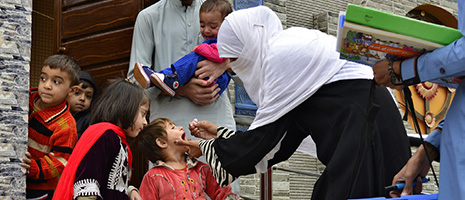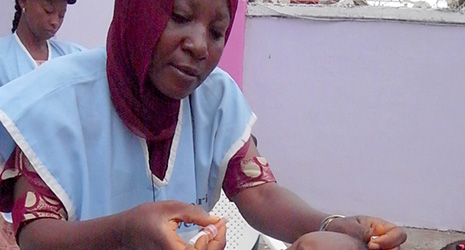Home > Highlighting JAPAN > Highlighting Japan December 2016 > Sixty Years of Commitment: Japan and the UN
Highlighting JAPAN


Polio Eradication: The Last Push
The Japan International Cooperation Agency (JICA) is implementing a number of projects in developing countries aimed at preventing the spread of infectious diseases such as polio.
Amid increasing globalization, infectious diseases have become a threat to mankind. Not only the three major infectious diseases, HIV/AIDS, tuberculosis, and malaria, but others, such as cholera and Ebola, are also threatening the lives of people.
On the other hand, the number of patients with infectious diseases has dropped sharply thanks to the development of new vaccines and treatments. One example of this is polio. Polio is an infectious disease caused by the poliovirus, which enters the body through the mouth and proliferates in the intestine. The majority of people who are infected with poliovirus do not develop any symptoms and naturally become immune to the disease at some point. However, some people develop paralysis in their limbs and suffer from movement disorders for the rest of their lives.
While no patient infected with wild-type poliovirus has been confirmed in Japan since 1980, polio has remained prevalent in developing countries for many years. In 1988, 350,000 people in 125 countries were affected by polio. Thanks to efforts by the international community, including Japan, the figure has dropped to 34 in three countries: Nigeria, Afghanistan and Pakistan, as of 30 November 2016. In 1980, humans successfully eradicated smallpox. The eradication of polio will follow and is very close to being achieved.
The Japan International Cooperation Agency (JICA) provides assistance to the three countries where polio is still prevalent by collaborating with international organizations, such as the World Health Organization (WHO) and the United Nations Children’s Fund (UNICEF).
“For infectious diseases, WHO generally creates an overall assistance program for individual countries, but allows donors such as JICA to adjust the details, provided we adhere to what was proposed,” says Ritsuko Yamagata of JICA’s Human Development Department. “The collaboration enables us to provide effective and efficient assistance.”
From Japanese Fiscal Year (JFY) 2000 to 2012, JICA offered grant aid to Nigeria to eradicate polio. UNICEF made good use of it for the purchasing of polio vaccines and solar-powered refrigerators for vaccine storage. In addition, JICA has supported efficient inoculation with polio vaccines of children under five years in Nigeria through the Japanese ODA loan-funded Polio Eradication Project. Furthermore, with the aim to improve polio examination techniques and support the development of human resources, JICA organized training in Nigeria in February 2016 at the National Polio Laboratory, which was established with support from the WHO. The purpose of the training was to improve the capacity of laboratory equipment maintenance. JICA dispatched a polio expert from the Japanese National Institute of Infectious Diseases and a consultant from a medical equipment company. They provided practical training on laboratory equipment maintenance and examination techniques to Nigerian counterparts.
In Pakistan, Japan has been assisting the nation’s polio eradication initiative since 1996. JICA has supported Pakistan’s effort through grant aid and loan projects. Through grant aid, it has supported procurement of vaccines and the establishment of cold chains, for example. The Polio Eradication Project (2011) and its Phase 2 (2016) has supported the procurement of vaccines and vaccination activities in partnership with the Gates Foundation. In addition, JICA is supporting a vaccination campaign that targets nine diseases such as measles, tetanus and polio, an area on which the Pakistani government is focusing. As part of the campaign, since 2014 JICA has been carrying out the Strengthening Routine Immunization Project in Khyber Pakhtunkhwa Province, the area bordering Afghanistan. The main purposes of the project are to improve the way that vaccines are managed, improve the technical capacity of those in charge of vaccinations, strengthen surveillance and increase general awareness. Pakistan aims to eradicate polio by 2019 and JICA is expected to contribute to that agenda.
JICA also provides Afghanistan with assistance, in collaboration with UNICEF. For instance, in February 2016 JICA offered grant aid to UNICEF to implement the Project for Infectious Diseases Prevention for Children. JICA is supporting the project in order to make polio and EPI (Expanded Program on Immunization) more accessible in a bid to increase the proportion of people who receive routine vaccinations and to improve the quality of the polio vaccination campaign. Through this project approximately 1.2 million infants below the age of one have been vaccinated against polio, tuberculosis, measles and hepatitis B. In addition, approximately 2.5 million pregnant women have been vaccinated against tetanus. JICA has implemented another grant aid program in Afghanistan to improve tuberculosis control facilities and to supply equipment as well as medications. JICA has also carried out initiatives aimed at building the capacity of administrators from the Ministry of Public of Health and clinical technologists.
“In 2014, cases of patients infected with Ebola were confirmed in Nigeria. However, by collaborating with the international community, Nigeria successfully contained the outbreak in a timely manner. It has been internationally recognized that their success is partly attributed to their experience gained in the polio control program,” Yamagata explains. “JICA is determined to contribute to the prevention of infectious diseases and to the improvement of hygiene by working to strengthen each country’s healthcare system.”
© 2009 Cabinet Office, Government of Japan






